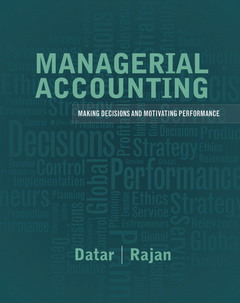Description
Cost management (1st ed )
Decision Making and Motivating Performance
Authors: Datar Srikant, Rajan Madhav
Language: English
Subject for Cost management (1st ed ):
Approximative price 301.02 €
In Print (Delivery period: 12 days).
Add to cart
Publication date: 05-2013
550 p. · 22.4x28.3 cm · Hardback
550 p. · 22.4x28.3 cm · Hardback
Description
/li>Contents
/li>Comment
/li>
Go beyond managerial accounting theory to the techniques used in management today.
Managerial Accounting: Making Decisions and Motivating Performance enables managers and business owners to attain the core skills they need to become integral members of their company?s decision-making teams.
This new program from established authors Srikant M. Datar and Madhav Rajan emphasizes decision-making and the effects of decisions. While many texts teach the theories and frameworks of management education, Managerial Accounting goes further by covering the capabilities and techniques necessary for effective management practice, as well as fostering attitudes that typify integrity, honesty, and fairness.
KEY TOPICS:
The Manager and Management Accounting; An Introduction to Cost Terms and Purposes; Cost?Volume?Profit Analysis; Job Costing; Process Costing and Cost Allocation; Activity-Based Costing and Activity-Based Management; Pricing Decisions, Customer Profitability, and Cost Management; Determining How Costs Behave; Decision Making and Relevant Information; Quality, Inventory Management, and Time; Capital Investments; Master Budget and Responsibility Accounting; Flexible Budgets, Cost Variances, and Management Control; Strategy, Balanced Scorecard, and Strategic Profitability Analysis; Transfer Pricing; Performance Measurement and Compensation
MARKET:
Managers and business owners who want to learn practical techniques for managerial accounting.
1. The Manager and Management Accounting
2. An Introduction to Cost Terms and Purposes
3. Cost–Volume–Profit Analysis
4. Job Costing
5. Process Costing and Cost Allocation
6. Activity-Based Costing and Activity-Based Management
7. Pricing Decisions, Customer Profitability, and Cost Management
8. Determining How Costs Behave
9. Decision Making and Relevant Information
10. Quality, Inventory Management, and Time
11. Capital Investments
12. Master Budget and Responsibility Accounting
13. Flexible Budgets, Cost Variances, and Management Control
14. Strategy, Balanced Scorecard, and Strategic Profitability Analysis
15. Transfer Pricing
16. Performance Measurement and Compensation
2. An Introduction to Cost Terms and Purposes
3. Cost–Volume–Profit Analysis
4. Job Costing
5. Process Costing and Cost Allocation
6. Activity-Based Costing and Activity-Based Management
7. Pricing Decisions, Customer Profitability, and Cost Management
8. Determining How Costs Behave
9. Decision Making and Relevant Information
10. Quality, Inventory Management, and Time
11. Capital Investments
12. Master Budget and Responsibility Accounting
13. Flexible Budgets, Cost Variances, and Management Control
14. Strategy, Balanced Scorecard, and Strategic Profitability Analysis
15. Transfer Pricing
16. Performance Measurement and Compensation
Three key facets of cost accounting and cost management are highlighted throughout the text:
• Calculating cost of products, services, and other cost objects;
• Analyzing relevant information for making decisions; and
• Obtaining information for planning and control and performance evaluation.
The emphasis on these three concepts across a wide range of topics keeps students focused on the practical applications of course material—and on how they will use what they learn in their future careers.
To help students see the concepts of managerial accounting in action, each chapter closes with a case that illustrates the managerial decision-making process. Each case describes a company, presents a challenge facing the managers, and explores how the managers address the challenge. The cases come from a varied group of high-level sources, including the Harvard Business School.
Emphasizing managerial decision making throughout, each chapter is built around an extended real-world example that illustrates a challenge that a manager or management team faces. These examples help students build the decision-making skills they will need to pursue managerial careers.
Modern topics and traditional coverage are integrated throughout the text to help students develop a comprehensive view of the management accounting tools and techniques used today. Hallmark concepts that remain relevant, such as job costing and variance analysis, are presented in conjunction with newer concepts, such as activity-based costing and lean accounting, to give students a comprehensive overview of contemporary practice.
Focusing on the practice of management accounting, the text emphasizes how the concepts presented in the chapter play out in practice. To this end, the text covers the challenges of implementing ideas, the potential difficulties in obtaining information, and the incentives for various parties to act or refrain
• Calculating cost of products, services, and other cost objects;
• Analyzing relevant information for making decisions; and
• Obtaining information for planning and control and performance evaluation.
The emphasis on these three concepts across a wide range of topics keeps students focused on the practical applications of course material—and on how they will use what they learn in their future careers.
To help students see the concepts of managerial accounting in action, each chapter closes with a case that illustrates the managerial decision-making process. Each case describes a company, presents a challenge facing the managers, and explores how the managers address the challenge. The cases come from a varied group of high-level sources, including the Harvard Business School.
Emphasizing managerial decision making throughout, each chapter is built around an extended real-world example that illustrates a challenge that a manager or management team faces. These examples help students build the decision-making skills they will need to pursue managerial careers.
Modern topics and traditional coverage are integrated throughout the text to help students develop a comprehensive view of the management accounting tools and techniques used today. Hallmark concepts that remain relevant, such as job costing and variance analysis, are presented in conjunction with newer concepts, such as activity-based costing and lean accounting, to give students a comprehensive overview of contemporary practice.
Focusing on the practice of management accounting, the text emphasizes how the concepts presented in the chapter play out in practice. To this end, the text covers the challenges of implementing ideas, the potential difficulties in obtaining information, and the incentives for various parties to act or refrain
© 2024 LAVOISIER S.A.S.




